|
April 23, 2020
Workers
Take Responsibility for
Working Conditions During Pandemic
Upcoming
Day of
Mourning
and COVID-19
- Peter
Page, Hamilton District Injured Workers Group -
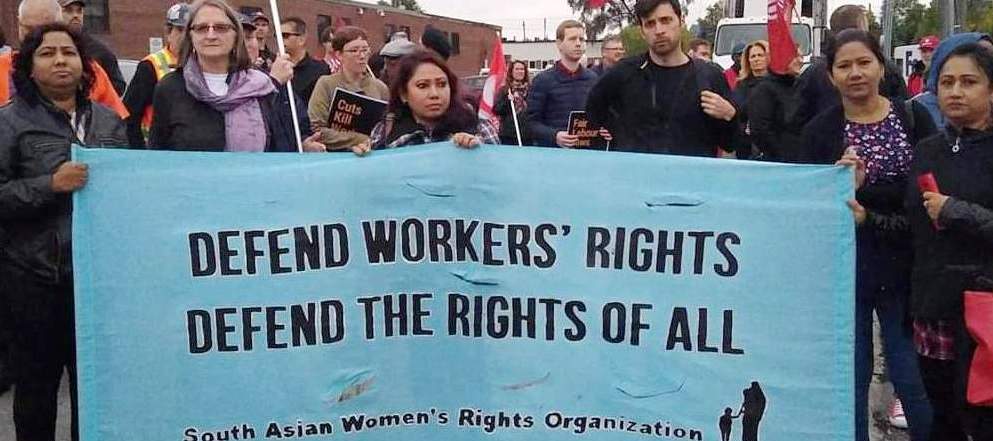
• Monopolies and Governments Are
Responsible for Devastating COVID-19 Outbreak at Cargill and Other
Meat-Packing Plants - Peggy Morton
• Interview on the
Keystone XL Pipeline - Pipeline Worker
André Vachon
• Quebec
Miners Demand Public Health Guidelines Are Respected as Mining Resumes
- Interview, André Racicot,
President, USW Local 9291, Abitibi
Workers Take Responsibility
for Working Conditions During Pandemic
- Peter Page, Hamilton
District Injured Workers Group -
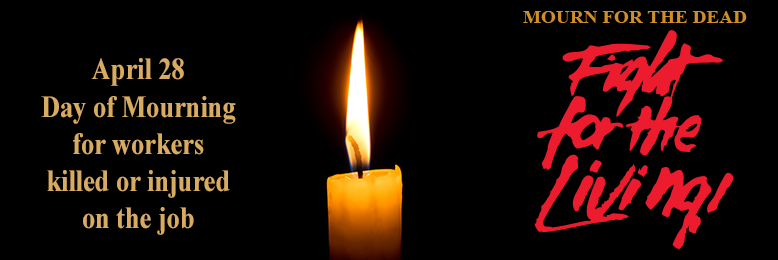
As we approach April 28, the National Day of
Mourning for workers
killed on the job, an even more sombre cloud will hang over us at
this year's ceremony as we remember all workers killed in the past
year.
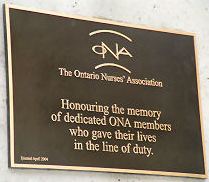
ONA monument in Toronto honouring nurses
who died treating patients
during the SARS outbreak in 2003.
|
Because of the COVID-19 pandemic, added to this
year's list will be
the frontline workers who have put their lives on the line to make sure
society does not come to a complete standstill. While doctors, nurses,
EMS workers, firefighters and police are who we think of as the first
line of defence, bus drivers, taxi drivers, truck drivers, personal
support workers, social workers and people who work with the homeless
are
all potential victims to the COVID-19 virus. Even our grocery store
workers or the person giving you your morning cup of coffee are also at
risk of contracting the virus. There are many other unsung heroes too
numerous to mention but they will not be forgotten as we
gather on April 28 to remember those who have fallen during this time
of crisis.
We have heard our politicians tell us that we are
at war with this
pandemic yet our frontline soldiers have been inadequately armed to
fight this enemy. Many of us stay at home praying it does not visit us
or a loved one while some selfishly think it isn't about them. This
will be a hard lesson to learn if it does visit someone who didn't take
it
seriously.
This pandemic has shown many cracks in our
infrastructure and how
fragile our economic system is. Many of our important publicly-run
systems have in the course of their privatization been neglected or
deregulated by the profit motive that now drives them, to our own peril.
The underfunding of our health care system has
never been more
apparent than it is now. A strong health care system that is driven by
compassion and not greed or profit should be the goal of all
governments as we hopefully get through this pandemic.
Now as we try to home school our children, it
dawns on us how
important teachers are and the need for a strong public education
system. How will having 29 students in a class room look post pandemic?
The lack of resources for parents to even begin to implement home
schooling has been exposed as well.
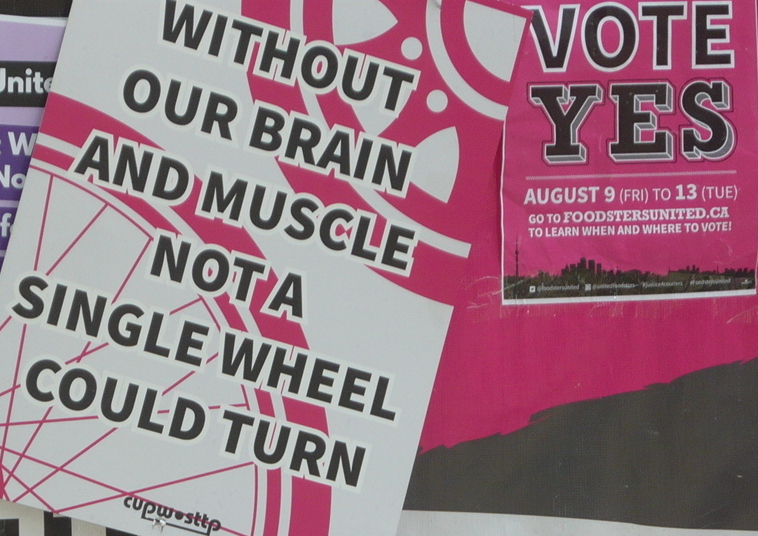 The
everyday workers who are living in a gig economy, barely able to earn a
living wage, are the ones cleaning hospitals or banks. The foreign
workers who come to our country to pick our fruit and work the farms
that feed us suddenly are important. Yet they are not appreciated
enough to be given a living wage. "Profit first, workers second"
seems to be the motto of the neo-liberal ideology. The
everyday workers who are living in a gig economy, barely able to earn a
living wage, are the ones cleaning hospitals or banks. The foreign
workers who come to our country to pick our fruit and work the farms
that feed us suddenly are important. Yet they are not appreciated
enough to be given a living wage. "Profit first, workers second"
seems to be the motto of the neo-liberal ideology.
What will happen after we solve this pandemic? Do
we return to life
as usual and forget about the sacrifices made, as politicians return to
their partisan ideologies? We the workers and people of society need to
hold these politicians to account and force them to listen to us in
this post-pandemic world whenever that day arrives. Unfortunately I
feel we will all return to our partisan corners and begin fighting once
again as to who has the best ideology and way forward.
We cannot let this happen and all political
parties need to rethink society as a whole and not just for the few.
The workers' compensation system should be
revamped and made to
adhere to it's 100-year-old agreement whereby injured workers gave up
their right to sue their employer when injured on the job in exchange
for compensation that lasts as long as the injury. I ask what Ontario's
Workplace Safety and Insurance Board (WSIB) has done for
injured workers during this pandemic? They certainly made sure
employers were taken care of while they ignored our pleas for help.
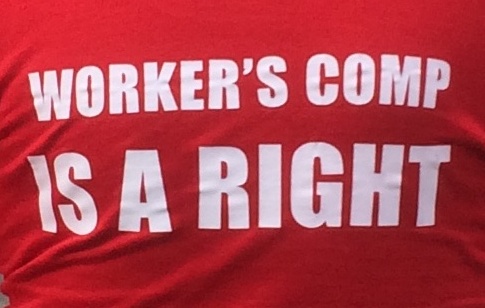 Many
workers will be affected by the COVID-19 and will need to file a claim
for compensation because they were exposed. The families of workers
killed by the COVID-19 virus should also be compensated and taken care
of by our compensation system. Many
workers will be affected by the COVID-19 and will need to file a claim
for compensation because they were exposed. The families of workers
killed by the COVID-19 virus should also be compensated and taken care
of by our compensation system.
That is why the current WSIB should be renamed the
Workers'
Compensation Board, a name that reflects its true purpose. As well, it
should remain as a publicly run system to insure it fulfills this
important mandate of caring for injured workers.
The workers who will have given the ultimate
sacrifice should not be
forgotten on this National Day of Mourning, April 28, or any worker for
that matter, for we are all soldiers of industry and without our labour
society will crumble. That has never been more apparent than during
this crisis.
Let those in power think about society as a
collective and that we
are all in it together and, as we come out the other side of this
crisis,
let us all work towards a society that includes the Rights of All.

- Peggy Morton -
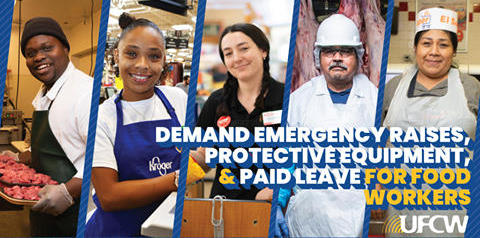
As of April 22, 440 workers at the
Cargill meat
processing plant in High River, Alberta, south of Calgary, have been
found to be infected with COVID-19 and one worker has died. With
community spread, including family members, there are now 580
cases linked to the plant. They include cases in long-term care homes
where family members of workers at Cargill work. On April 20, Cargill
finally announced a temporary closure of the plant. Two thousand people
work at the plant.
Ninety-six COVID-19 cases have also been confirmed
at
the JBS meat packing plant in Brooks, Alberta. A worker has died at
JBS, with the cause of death not yet confirmed. JBS refuses to
close the plant despite the demands of the workers and their
union. One case at the Harmony beef plant in Balzac, Alberta
in
March has been resolved. The three plants represent approximately
three-quarters of beef suppliers in Canada. Also in Alberta, there are
to date 32 confirmed cases directly linked to the Imperial Oil Kearl
Lake oil sands project north of Fort McMurray. This is a "fly-in,
fly-out" operation where workers come in from many parts of Canada, and
cases have now spread to BC, Saskatchewan, and Nova Scotia. In all, one
in five cases of COVID-19 in Alberta are linked to outbreaks in these
two sectors, with the number expected to grow according to the Chief
Medical Officer of Health.
 Workers'
Forumexpresses
heartfelt condolences to the family, friends and co-workers
of the workers who died and to those who are sick. This tragedy did not
need to happen. It happened because these gigantic global monopolies
are allowed to do as they please and conduct "business as usual"
according to self-serving definitions of health
and safety. It happened because the right of the workers to have the
final word on safe working conditions during the pandemic was denied,
and the proposals of the union ignored. It also happened because many
workers are Filipino contract workers who are vulnerable and considered
expendable. All of it reveals the inhumanity of those who have usurped
the positions of power, how detached they are from the problems of the
working people about which they know nothing and reveals the
absence of a public authority which will take responsibility, and the
unbridled greed of this gigantic global monopoly which does not
recognize that workers are human beings but treats them as things. Workers'
Forumexpresses
heartfelt condolences to the family, friends and co-workers
of the workers who died and to those who are sick. This tragedy did not
need to happen. It happened because these gigantic global monopolies
are allowed to do as they please and conduct "business as usual"
according to self-serving definitions of health
and safety. It happened because the right of the workers to have the
final word on safe working conditions during the pandemic was denied,
and the proposals of the union ignored. It also happened because many
workers are Filipino contract workers who are vulnerable and considered
expendable. All of it reveals the inhumanity of those who have usurped
the positions of power, how detached they are from the problems of the
working people about which they know nothing and reveals the
absence of a public authority which will take responsibility, and the
unbridled greed of this gigantic global monopoly which does not
recognize that workers are human beings but treats them as things.
These sectors have been deemed "essential services" by the Alberta
government and on this basis employers have been given license to
conduct
"business as usual" through self-serving definitions of "what is
possible." This shows a broken system in which the state has been
restructured so no vestige of a public authority is left.
The growing size of the outbreaks at
the High River
Cargill plant and Brooks JBS plant and at the Kearl Lake oil sands
plant show that the workers and Canadian people cannot trust
these
gigantic global monopolies with their health and safety. The workers
know what is needed and have put forward the required actions, but the
human factor/social consciousness has been blocked by the greed and
narrow self-interest of the owners.
Proposals to Ensure Safety at Cargill Plant
Disregarded
"It's a tragedy. We asked days and days ago for
[the Cargill plant] to be
closed temporarily for two weeks, send all of the workers home with pay
to isolate. That was when we were aware of 38 cases. That was before
they set up a dedicated testing facility in the area. We'll never know
how much lower that number might've been," United Food and
Commercial Workers Union Local 401 President Tom Hesse said on April 17.
On March 20, the union called for concrete
measures to protect the
workers and the right of Canadians to a secure food supply. The union
presented a plan to reconfigure the workplace, putting more distance
between workers. It proposed extending the work week to allow the line
to slow and social distancing and rigorous safety measures to be
implemented. The union also called for accommodations for workers at
increased risk if they contract COVID-19, for workers impacted by
school and daycare closures, voluntary overtime and waiving of sick
note requirements.
Cargill did not bother to answer the proposals for
social distancing
on the work floor. Instead, the company arrogantly declared, "We have
made several decisions through the lens of putting people first as we
try to minimize the financial hardship our employees are facing." It
then called on the union to urge people to come to work.
"Minimizing the financial hardship" apparently meant keeping the lines
going full speed at all costs.
On April 12, 250 workers signed a letter to the
Mayor of High River
calling on him to support their call to close the plant for two weeks,
CBC reported on April 19. On April 13, UFCW Local 401 President Tom
Hesse also publicly demanded a temporary two-week shutdown of the plant
to conduct a comprehensive assessment of its safety,
with full compensation paid to every worker. The union also demanded
"an immediate meeting with Union officials, experts, and government
officials of appropriate competency and jurisdiction to design clear
and enforceable rules around health and safety in your workplace." At
the time Hesse pointed out that 30 members of the UFCW have died
across North America and that it is time to act and protect lives.
On April 14, Cargill temporarily eliminated one
shift and laid off
1,000 workers, UFCW reported. Several days later, all activity was
suspended on the "kill floor" while beef continued to be processed. The
plant normally processes about 4,000 head of cattle each day and is one
of the two primary beef suppliers for McDonald's Canada.
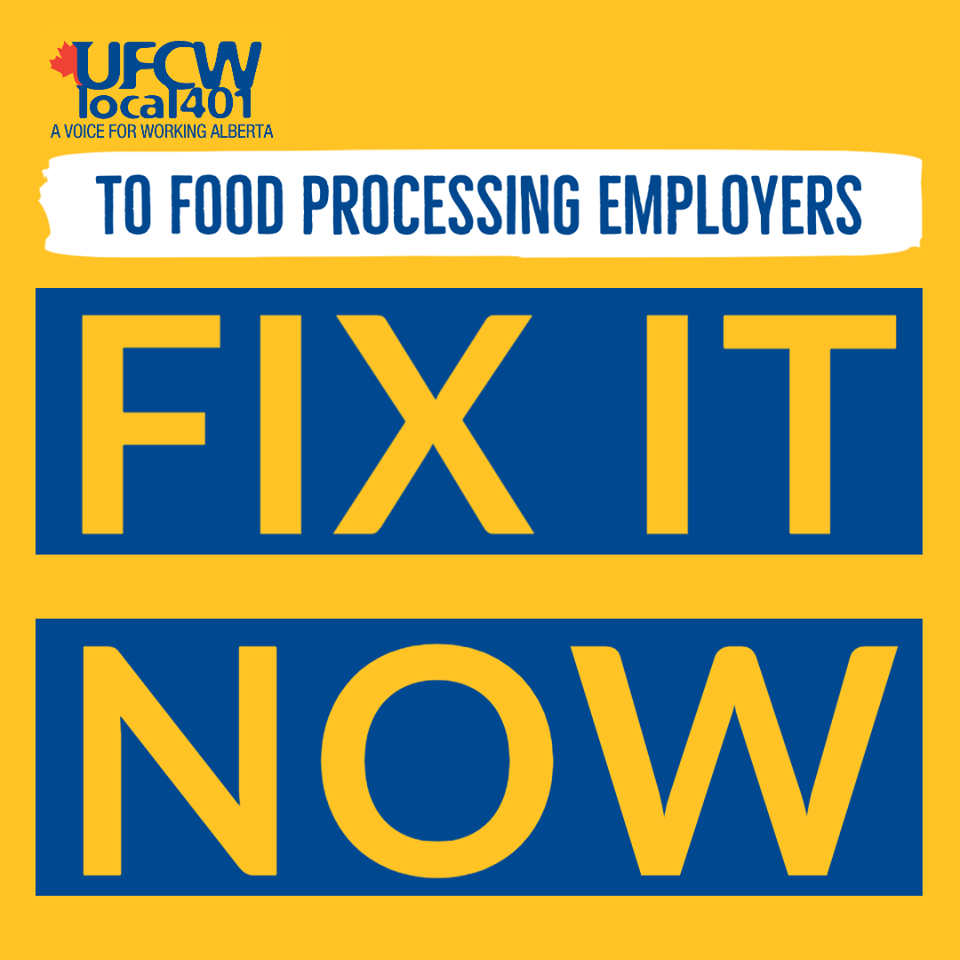 While
the workers and their union have been very active in speaking out about
what is required, neither Cargill nor the Alberta government has taken
any responsibility for the consequences of their decisions to refuse to
accept the informed decisions of the workers as to what was needed. It
puts the lie to the claims that "we are all in this
together." While
the workers and their union have been very active in speaking out about
what is required, neither Cargill nor the Alberta government has taken
any responsibility for the consequences of their decisions to refuse to
accept the informed decisions of the workers as to what was needed. It
puts the lie to the claims that "we are all in this
together."
All along, Alberta Agriculture Minister Devin
Dreeshen has
maintained that government agencies had worked to keep essential
services open "and to ensure protocols are in place in the event of
worker illness" and that he is confident the plant is safe. He repeated
the claim that the plant is "safe" in a teleconference with the workers
on April
18.
The authorities are now trying to divert from the
issues
being raised about the working conditions and instead are blaming the
workers and their living conditions, suggesting that the spread was not
at work but in car pooling and households where it is impossible to
self-isolate because of cramped living conditions. This is to suggest
that their accommodations have no relation to the low wages of the
workers, and to cover up that Cargill is in fact responsible
for
making housing arrangements for temporary foreign workers who work at
Cargill.
The workers and their union have repeatedly
exposed this cover-up as
false. The conditions in the plant make social distancing impossible as
the workers are "elbow to elbow" on the line. Workers told the CBC they
have been pressured to return to work after testing positive. As well,
Cargill brought in bonuses and hourly wage increases,
which workers would be eligible for only if they are present for every
shift. Punishing those who become sick with COVID-19 or for complying
with isolation measures is beneath contempt.
The system is broken when no one will take
responsibility. Both
Cargill and the provincial government knew the virus was spreading
since early April. The federal government is responsible for inspection
of meat packing facilities, and certainly should have mandated
inspectors to take action. But no one accepts any responsibility for
this
situation.
What is being revealed is not only the brutality
of
these monopolies who have seized control of Canada's food supply, but
that neither the government nor the monopolies can be trusted to defend
anything but their own self-interest and control of decision-making in
the service of the financial oligarchy. The workers have the right to
decide whether working conditions are safe and acceptable to them. In
defending themselves, the workers have also fought to prevent the
spread of COVID for which Cargill and the governments in its service
must take full responsibility. The JBS plant must be closed at
once, and a full public investigation held at once into the actions and
negligence of these monopolies, the Alberta government and Alberta
Health Services. The workers must have the final say, and the plants
must not be reopened until the workers agree that acceptable conditions
are in place.

- Pipeline Worker
André Vachon -
Alberta Premier Jason Kenney announced on March
30 that "shovels
are in the ground" for the Keystone XL pipeline as of 6:00 am that
morning. TC Energy (formerly TransCanada Pipelines), Kenney said, had
decided to go ahead with the project after the provincial government
agreed to buy a $1.5 billion equity stake in the project, as well as
to a $6 billion loan guarantee. This decision was made after investors
could not be found for such a risky venture.[1]
Alberta will sell its stake in the company back to TC Energy if and
when oil is flowing. That much is known but the terms and conditions
are confidential. Albertans are in the dark about what
has been agreed upon, but media reports indicated that the equity stake
will cover construction costs for 2020.
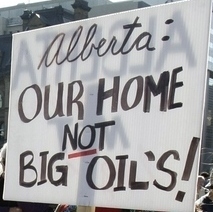 Kenney
claimed that 520 kilometers of pipeline in two Canadian spreads would
be built in 2020, as well as several spreads in the U.S. "For so many
of the people who've been laid off in the oil field sector right now,
they will have an opportunity to work for TC Energy, its contractors.
For the little hotels and at least some of the restaurants
that can operate along the route, they will have business..." Kenney
claimed that 520 kilometers of pipeline in two Canadian spreads would
be built in 2020, as well as several spreads in the U.S. "For so many
of the people who've been laid off in the oil field sector right now,
they will have an opportunity to work for TC Energy, its contractors.
For the little hotels and at least some of the restaurants
that can operate along the route, they will have business..."
Workers' Forum interviewed
pipeline worker André Vachon about the announcement.
Workers' Forum:
What do you make of Jason Kenney's announcement about construction of
the Keystone XL.
André Vachon:
Well the idea of "so many people" going to work on
a new pipeline in the midst of a pandemic is outrageous, showing so
little regard for our health and safety. We are also seeing the
consequences of such decisions now at the Cargill meat packing plant,
as well as at the Kearl Lake Oil Sands project. It is basically
impossible to social distance in pipeline work. The most that could be
done is some ground clearing. Then workers will have to find
accommodation, either renting rooms in homes or in hotels or motels,
again violating social distancing, as well as that workers travel to
the site by bus.
But as it turns out, the announcement is just as
fraudulent as it is
indifferent to our well-being. Pipeliners immediately questioned the
claim that construction had begun, as not a single job for the pipeline
has been posted anywhere, and no contractors are hiring. What's more,
every worker in the oil and gas industry knows that pipeline
construction shuts down during spring break-up, when road bans are in
effect making it impossible to move heavy equipment. Pipeline
construction simply doesn't take place in the spring in Alberta when
the ground is still too wet. My union, the Operating Engineers,
immediately reported that construction on the Saskatchewan section of
the
pipeline won't begin until 2021. I understand that a few days after
this announcement, Kenney "clarified" that there were about 100 workers
doing some preliminary work in Montana. Even that isn't going to
happen, as a judge in Montana ruled on April 15 that the U.S. Army
Corps of Engineers failed to adequately consider effects of the
Keystone XL pipeline and its construction on endangered species as it
traverses rivers and streams. So TC Energy no longer has a permit to
move ahead on Montana.
WF: Kenney
has also stated that he is hoping to get the economy moving again by
the end of May.
AV: Well
that is about when the road ban would be
lifted in a normal year. But we are half way through April and there is
no spring thaw yet, so it will be much later, and pipeline construction
almost never takes place at that time of year anyway, and especially
this year when the weather has been so cold. He clearly is
pushing for "business as usual" as opposed to putting our health first.
WF: Kenney
also stated that he had talked to the
Governors of Montana, South Dakota and Nebraska and that they, as well
as TC Energy, had assured him that they would be taking all precautions
necessary to protect workers and communities.
AV: Well
that is pretty ripe, because I know South
Dakota and Nebraska were among the last holdouts, they didn't want to
shut anything down, just carry on business as usual and take no
precautions to protect the people against COVID-19. So to suggest that
they are going to look after the workers is a complete fraud. Really
what it looks like is that the Alberta government is actually going to
pay for TC Energy to build the pipeline through the U.S. this year.
Those are the jobs he is talking about, which put the U.S. workers at
risk.
WF: TC
Energy says there will be 1,400 jobs in Canada to build the pipeline.
Can you comment?
AV: That
figure sounds realistic. But it
is important to know what is meant by a "job." It doesn't mean two
years of work. Contractors bid to complete a section of the
pipeline, and then we are hired for that job, to complete that
section, which usually takes a maximum of three months, during
which we work six and sometimes seven days a week, 10 or 11 hours a
day. Then comes a long period of unemployment. This bragging up of the
benefits of pipeline construction job-wise is always overblown. It is
part of the boom and bust cycles that are inherent to our industry. For
Kenney to tout pipeline construction jobs as bringing prosperity to
Albertans is nonsense.
 Alberta
has to stop being dependent on shipping oil to the U.S. to fuel the war
economy and war machine. We want to make Canada a zone for peace, so a
new direction is needed. Of course no one ever asks us. Why should
workers be blackmailed that either we support this direction, which we
already know doesn't provide security, or it's
nothing, no work? And to top it off billions of dollars is handed over
to TC Energy, which even dropped Canada from its name "to reflect the
expansion of its business beyond Canada to the United States." Alberta
has to stop being dependent on shipping oil to the U.S. to fuel the war
economy and war machine. We want to make Canada a zone for peace, so a
new direction is needed. Of course no one ever asks us. Why should
workers be blackmailed that either we support this direction, which we
already know doesn't provide security, or it's
nothing, no work? And to top it off billions of dollars is handed over
to TC Energy, which even dropped Canada from its name "to reflect the
expansion of its business beyond Canada to the United States."
As building trades workers, our skills are not
confined
to building
pipelines. Just imagine the public enterprise which $6.5 billion could
generate to provide a new direction for the economy, instead of giving
it to a global monopoly for a risky venture. There are alternatives.
For example Alberta could invest in a public enterprise to make N95
masks, which are not produced in Canada even though they are made from
polypropylene, a petrochemical product. Or the much-needed public lab
which the Kenney government cancelled. We could be constructing a
publicly-owned enterprise to make vaccines. Public enterprise to
manufacture such products would ensure security of supply for
Canada and a source of revenue for the public treasury. An urgent need
-- perhaps the most urgent -- is modern culturally appropriate housing
on the First Nations reserves and Metis settlements,
which is
appalling in Alberta, as well as in cities for the urban Indigenous
population. The $7.5 billion in equity and
loan guarantees could go a long way if it is the people of Alberta who
decide how to spend it. We could be building those enterprises to
benefit Canadians, not a pipeline for the benefit of TC Energy, the
U.S. war machine and to destroy the economies of countries who don't
submit to the U.S.
WF: Thank
you very much.
Note
1. See TML
Weekly Supplement,
Alberta Government's $7.5 Billion Energy
Pay-the-Rich Scheme, April 18, 2020.

- Interview,
André Racicot, President, USW Local 9291, Abitibi -
On April 13, the Government of Quebec announced
that mining
activities, which have been halted across Quebec since March 25 because
of the COVID-19 pandemic, would gradually resume as of April 15. Workers'
Forum
recently spoke with André Racicot, President of United
Steelworkers (USW) Local 9291 about
the conditions under which the
resumption of activities will take place and the role of workers to
ensure that it is done in full respect of workers' health and safety.
USW Local 9291 represents, among others, workers at Iamgold's Westwood
Mine in Preissac, Abitibi-Témiscamingue. André is
a specialist in
health and safety issues in the mining sector.
Workers' Forum:
How are the preparations going for the resumption of mining operations
at the Westwood mine?
 André
Racicot: With regard to the resumption of work
in the mining sector, we have been working hard with the employer to
put in place the best health standards for the workers, to ensure that
they are protected from becoming infected with the virus. A number of
protocols have been put in place regarding cleanup and actions
in the workplace, including respecting the two-metre distance between
workers. There was a problem that needed to be resolved with regard to
the mining cage that carries the workers underground. Separators were
put in the cage and the number of people that can be carried at a time
is limited. Before, we could put 25 people in the cage, but now
we are reducing the number by half. Workers are not allowed to talk in
the cage and they have to face the wall, and are separated by curtains.
The curtains and the cage are completely disinfected after each shift. André
Racicot: With regard to the resumption of work
in the mining sector, we have been working hard with the employer to
put in place the best health standards for the workers, to ensure that
they are protected from becoming infected with the virus. A number of
protocols have been put in place regarding cleanup and actions
in the workplace, including respecting the two-metre distance between
workers. There was a problem that needed to be resolved with regard to
the mining cage that carries the workers underground. Separators were
put in the cage and the number of people that can be carried at a time
is limited. Before, we could put 25 people in the cage, but now
we are reducing the number by half. Workers are not allowed to talk in
the cage and they have to face the wall, and are separated by curtains.
The curtains and the cage are completely disinfected after each shift.
As regards transport vehicles in the mine, they
are being cleaned
and disinfected regularly and no more than two workers can be
transported at a time. The driver is at the wheel and the other worker
sits in the back seat on the right side. In the transport vans, the
two-metre distance between workers is respected.
For the underground shelters, the dining rooms,
for example, have
been disinfected and for each meal the cleaning staff has been
increased. Meal times are organized so that there are not too many
people in the dining rooms at the same time and the two-metre distance
is respected. Work schedules have been modified to allow for a gradual
entry into the mine, not everyone together. Workers are required to
wash their hands for 20 seconds on a regular basis. Public Health
guidelines are being followed.
Each department has developed protocols for cases
where they are
unable to maintain the two-metre distance. For example, in the case of
mechanics, when they have a task such as repairing a pump, it takes two
workers to do the task. In that case they will have to wear masks to
prevent the spread of the virus to their co-workers.
We will have N95 masks and surgical masks. We also
have masks that
are normally used underground, and these are also effective in
preventing the spread of droplets. We have taken inventory at the
emergency health committee to ensure that there will not be a shortage
of masks.
There is a real change that has been made to
ensure that the work
schedules and the return to work protocol allow for health standards to
be put in place. It has not been easy, but we can see that there is a
real willingness on everyone's part to take charge.
WF: Has
mining per se
resumed?
AR: It is in
the process of restarting. The first
people who have been recalled are the mechanics at the plant who work
on a crusher. As far as I know, there are teams of mobile mechanics who
are starting to return to work. The actual mining operations are going
to start around April 25, I believe. Each person is going to be
called in and they're going to get a health standards briefing, because
this represents a 180-degree change. In order to assimilate this
information and apply it, everybody's going to have to do their share.
To make sure that the mining of the ore is really going to work
properly, I think it's going to take until late April or early May.
WF: Will the
guidelines you spoke about be the same throughout the mining sector in
Quebec?
AR: As far
as I know, with the information I have, it
seems that these guidelines will apply throughout Quebec. How it works
is that the Quebec Mining Association (QMA) gives the guidelines to its
members. Generally, members follow these guidelines. There are small
variations, but overall these are the guidelines that are
followed throughout Quebec.
WF: How do
you see the role of workers in this process of resuming operations?
AR: Our role
is to ensure that safety and health
standards are enforced. We have a role to play in identifying,
controlling and eliminating risks. Our role is to prevent the spread of
this disease. We don't want any worker to be infected. We don't want
the pandemic to enter the company. We care about our families and loved
ones, about not infecting them. We believe that not only is it
dangerous for members, but it is bad for the industry because Public
Health can stop the activity of a mine if the standards are not met. I
appreciate the company's willingness to put guidelines in place that
are good, but it remains to be seen how that will be applied in the
field. That is
what it all comes down to. We're going to focus all our efforts on
monitoring and identifying problems. We have to make sure that the
guidelines are respected. There may be all sorts of reasons that they
are not respected -- there may be administrative pressures, or there
may be a problem adapting to change, or instructions that are not being
followed, so we will keep an eye on everything.
We are putting our union structure into action. As
far as I'm
concerned, I'm assigned to tele-work and there are union officers who
work at the mine to report on the application of safety and health
standards. I dispatch the prevention representative to check how things
are actually working at the mine. He has been trained to do that and he
has
clear guidelines for reporting on a daily basis. He is working 40 hours
a week exclusively on prevention, checking all aspects of health and
safety and health standards, including those provided by the Labour
Standards, Pay Equity and Workplace Health and Safety Board (CNESST).
I went to the mine twice recently. I did a
simulation on how the
return to work is going to be done. I saw some shortcomings, especially
with regard to hand washing, where we must ensure that the worker uses
the 20 seconds needed to wash his hands properly.
WF: Would
you like to say something in conclusion?
AR: We agree
to go back to work, but not at any cost.
We want to make sure that our workers are well protected so as to
protect their families and loved ones. It is in our best interest to
follow the guidelines of Public Health.

(To access articles
individually click on the black headline.)
PDF
PREVIOUS
ISSUES | HOME
Website:
www.cpcml.ca
Email: office@cpcml.ca
|






 Workers'
Forumexpresses
heartfelt condolences to the family, friends and co-workers
of the workers who died and to those who are sick. This tragedy did not
need to happen. It happened because these gigantic global monopolies
are allowed to do as they please and conduct "business as usual"
according to self-serving definitions of health
and safety. It happened because the right of the workers to have the
final word on safe working conditions during the pandemic was denied,
and the proposals of the union ignored. It also happened because many
workers are Filipino contract workers who are vulnerable and considered
expendable. All of it reveals the inhumanity of those who have usurped
the positions of power, how detached they are from the problems of the
working people about which they know nothing and reveals the
absence of a public authority which will take responsibility, and the
unbridled greed of this gigantic global monopoly which does not
recognize that workers are human beings but treats them as things.
Workers'
Forumexpresses
heartfelt condolences to the family, friends and co-workers
of the workers who died and to those who are sick. This tragedy did not
need to happen. It happened because these gigantic global monopolies
are allowed to do as they please and conduct "business as usual"
according to self-serving definitions of health
and safety. It happened because the right of the workers to have the
final word on safe working conditions during the pandemic was denied,
and the proposals of the union ignored. It also happened because many
workers are Filipino contract workers who are vulnerable and considered
expendable. All of it reveals the inhumanity of those who have usurped
the positions of power, how detached they are from the problems of the
working people about which they know nothing and reveals the
absence of a public authority which will take responsibility, and the
unbridled greed of this gigantic global monopoly which does not
recognize that workers are human beings but treats them as things. While
the workers and their union have been very active in speaking out about
what is required, neither Cargill nor the Alberta government has taken
any responsibility for the consequences of their decisions to refuse to
accept the informed decisions of the workers as to what was needed. It
puts the lie to the claims that "we are all in this
together."
While
the workers and their union have been very active in speaking out about
what is required, neither Cargill nor the Alberta government has taken
any responsibility for the consequences of their decisions to refuse to
accept the informed decisions of the workers as to what was needed. It
puts the lie to the claims that "we are all in this
together." Kenney
claimed that 520 kilometers of pipeline in two Canadian spreads would
be built in 2020, as well as several spreads in the U.S. "For so many
of the people who've been laid off in the oil field sector right now,
they will have an opportunity to work for TC Energy, its contractors.
For the little hotels and at least some of the restaurants
that can operate along the route, they will have business..."
Kenney
claimed that 520 kilometers of pipeline in two Canadian spreads would
be built in 2020, as well as several spreads in the U.S. "For so many
of the people who've been laid off in the oil field sector right now,
they will have an opportunity to work for TC Energy, its contractors.
For the little hotels and at least some of the restaurants
that can operate along the route, they will have business..." Alberta
has to stop being dependent on shipping oil to the U.S. to fuel the war
economy and war machine. We want to make Canada a zone for peace, so a
new direction is needed. Of course no one ever asks us. Why should
workers be blackmailed that either we support this direction, which we
already know doesn't provide security, or it's
nothing, no work? And to top it off billions of dollars is handed over
to TC Energy, which even dropped Canada from its name "to reflect the
expansion of its business beyond Canada to the United States."
Alberta
has to stop being dependent on shipping oil to the U.S. to fuel the war
economy and war machine. We want to make Canada a zone for peace, so a
new direction is needed. Of course no one ever asks us. Why should
workers be blackmailed that either we support this direction, which we
already know doesn't provide security, or it's
nothing, no work? And to top it off billions of dollars is handed over
to TC Energy, which even dropped Canada from its name "to reflect the
expansion of its business beyond Canada to the United States."